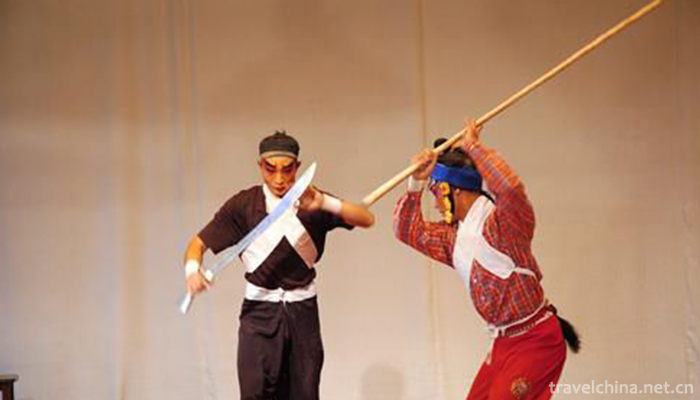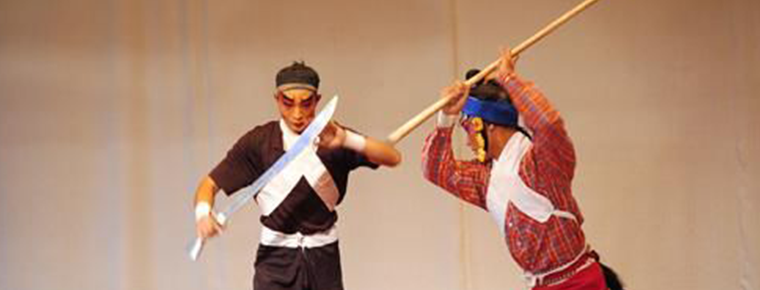Da Xian Opera
Da Xian Opera
Daxian opera is a local traditional drama in Huaxian and Puyang counties of Henan Province, and one of the intangible cultural heritage at the national level. The singing music of Daxian opera belongs to the music brand. Its roles are divided into Wusheng, Wudan and Wuhua. It has exquisite facial makeup, delicate makeup and distinct personality. The orchestra is divided into soft field and hard field.
Daxian Opera, formerly known as Gongxing Ban, also known as Xiangzi Opera, is an ancient and rare multi-tone opera. It centers on Kaifeng and Puyang in Henan Province, and is popular in northeastern Henan Province, southern Hebei Province and southwestern Shandong Province. It is generally believed that Daxian Opera has a certain relationship with Liyuan Opera of Tang Dynasty, and inherited the tradition of Northern Opera of Song and Yuan Dynasty in the course of its evolution and development.
On May 20, 2006, Daxian Opera was approved by the State Council of the People's Republic of China to be listed in the first batch of national intangible cultural heritage, numbered IV-44.
historical origin
Daxian opera, also known as "Xiangzi opera", is an ancient and rare multi-tone opera. It is named for its accompaniment instrument, which starts with three strings. It is also called Daxian opera because it originated from the imperial opera of the Tang Dynasty. Some Tang and Song Daqu, court music, primitive operas, ancient forms of performance, etc., are preserved in the original flavor of Daxian opera. In 2006, Daxian Opera was listed in the first national intangible cultural heritage protection list by the State Council.
Puyang Daxian Opera originated from court music in Tang Dynasty. In Wang Guowei's "History of Song and Yuan Opera", many of the Tang and Song Dynasty operas mentioned in his book, "Huang Ying'er", "Out of the Team", "Mocking Order", "Rolling Embroidery Ball", "Haili Flower", "Jiangtou Jingui", "Lahua Ganzhou" and so on remain in the original flavor of the opera brand of Daxian Opera. Judging from the fact that they have many big operas and have their core "five suites" in Daxian Opera, the opera before Song Dynasty has its core. The couplet phenomenon was corrected in the play.
Puyang Daxian Opera still maintains its ancient performance forms, such as "Juangjiaguan Opera" before Tang Dynasty and "Funny Opera" in Song and Yuan Dynasty Zaju (such as "Lajiangxu", "Daguanxi" and so on), "Chain Yan Duan" (such as "Turn-around", "Qizhong-mei", "Guan Deng", "Barefoot Opera" (such as "Xue Gangda Dynasty", "Xiqi", "Hongniang Xia Shu" and so on). These characteristics prove that Puyang Daxian Opera existed at least in the Song Dynasty, matured in the Yuan Dynasty and reached its peak in the early Ming Dynasty. As early as the eleventh year of Hongzhi in the Ming Dynasty (1498), there were traces of Daxian opera activities (on the sub-stele of "the slide to rebuild the monument of Mingfu Temple":"... In addition to repairing Buddhist pagodas, the above alms are dedicated to Dabang Opera and Daxian Opera. During the Ming and Wanli Dynasties, there were large-scale "Gongxing Ban" Banxian. When the Qing Dynasty Daxian Opera reached its heyday, there were more classes. There were 18 classes in Bianliang area alone, which were divided into "courtesy", "respect" and "prosperity". After that, the "courtesy" door went out to Shandong; the "respect" door flowed into the slippery county; and the "prosperity" door went unknown. The merger of "Jing" Men into Slipping County and "Gongxing Ban" strengthens the strength and has a greater impact. During the reign of Guangxu in Qing Dynasty, it was renamed "Daxing Ban". In 1948, it was named "People's Opera Club" by the governments of Hebei, Shandong and Henan Border Areas and managed by plain provinces. In 1952, it was handed over to Huaxian County and named "Huaxian Daxian Drama Troupe". In 1960, Puyang Daxian Drama Troupe was abolished and merged with Huaxian County. It was called "Huaxian Daxian Drama Troupe". In 1969 (during the Cultural Revolution), it merged with the Yuju Opera Troupe of Huaxian County, and Daxian Opera disappeared throughout the country. In 1979, it resumed its establishment.


-
1.Longmen Grottoes Scenic Area
Longmen Grottoes is one of the treasure houses of Chinese stone carving art. It is now a world cultural heritage, a national key cultural relics protection unit and a national AAAAA class tourist attr
Time 2018-12-09 -
2.Liupanshan National Forest Park
Liupanshan National Forest Park is located in the center of the triangle formed by Xi'an, Yinchuan and Lanzhou. It is located in the south of Ningxia. It spans two counties and one district in Jingyua
Time 2018-12-24 -
3.Dalian Sun Asia Ocean World
China's Romantic Marine Theme Paradise and Romantic Dalian Tourist Resort - Dalian Sanya Marine World. Located on the west side of Xinghai Square and in Xinghai Park, facing the sea and adjacent to ya
Time 2019-01-07 -
4.Drum Mountain
Gushan is located in the east of Jin'an District, Fuzhou City, Fujian Province, and on the North Bank of Minjiang River. It is about 8 kilometers away from the downtown area. It is one of the most fam
Time 2019-01-12 -
5.The Gu Guan Great Wall
Guguan Great Wall is located in Xinguancun, Pingding County, Shanxi Province, on the western side of Taihang. It starts at Niangziguan Jiayugou in the north and reaches Baihui Village in the south.
Time 2019-01-12 -
6.Taipinggou Golden Town
The scenic spot of Taipinggou Gold Town is based on the history of gold mining in Taipinggou in late Qing Dynasty. It deeply excavates the historical culture and characteristic tourism resources
Time 2019-01-18 -
7.Bullfight
Bull-wrestling is a traditional competitive sport of the Hui people. It means throwing, wrestling and throwing. It can also be called bullfighting of the Hui people.
Time 2019-05-01 -
8.Venus Inkstone Making Skills
Venus inkstone making technology, the local traditional handmade inkstone making technology in Xingzi County, Jiangxi Province, is one of the national intangible cultural heritage.
Time 2019-05-07 -
9.Traveling Books in Ningbo
Ningbo Walking Book, originally known as "Lotus Document" or "Plough Document", is one of the traditional local operas in Ningbo, Zhejiang Province. Sing in Ningbo dialect. Ningbo
Time 2019-06-08 -
10.Shaoshutun and Munona
Manmaisankang National AAA Scenic Area, where every day the love story between Zhaoshu Tun and the Peacock Princess Munona, beautiful music, more than 100 peacocks falling from the sky, the beautiful
Time 2019-07-25 -
11.Ba Jin
Ba Jin (November 25, 1904 - October 17, 2005), male, Han nationality , Sichuan Chengdu Man, his ancestral home Zhejiang Jiaxing 。 Ba Jin's original name Li Yao Tang And another pen name, Pei pole, bli
Time 2019-09-06 -
12.Deyang scenic spot
There are Sanxingdui ancient Shu civilization sites in Deyang City, where a large number of national treasure level cultural relics such as bronze Dali Man, bronze mask, bronze sacred tree, gold stick and Bian Zhang were unearthed. There are also the pangtong
Time 2020-12-14